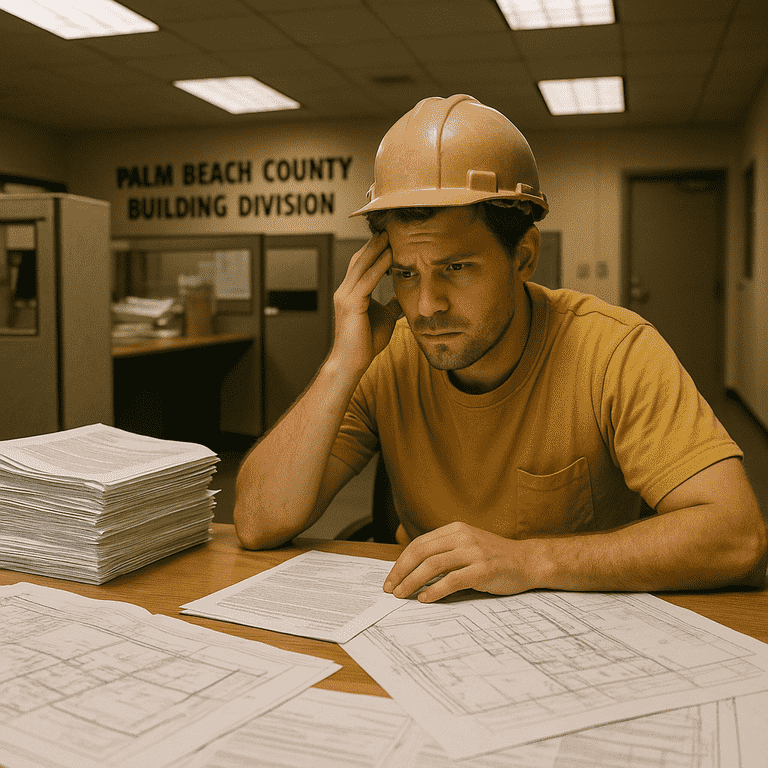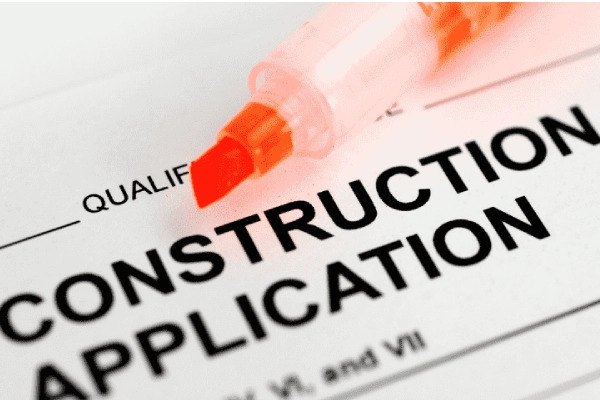First-Time Applicant Stories with Construction Permits in PBC
First permit? Expect a mess of paperwork and a lot of waiting. The county's instructions don't make things clear. The forms are confusing. The process is slow. Most people think it's just a signature and a stamp, but it's not. You'll need patience and a sharp eye for details to get through it.

Facing the Permit Maze
Every project starts with a question: does this work need a permit? In Palm Beach County, the answer rarely feels simple. Replacing a faucet doesn't need a permit. Moving a wall or adding a room? The county wants full details. Electrical upgrades, new plumbing, and anything that touches the structure always land on the permit list. The building department checks every line. Miss a detail, and the application sits untouched. Submit the wrong plans, and the process resets. The county doesn't chase you for missing paperwork. The file just waits, and so does your project.
Contractors sometimes hand over sketches, thinking they'll pass. The county wants professional drawings. They want site plans that show every measurement. They want engineering stamps for anything that changes the bones of the house. First-timers often find this out after the first rejection. The learning curve feels steep, and the clock keeps ticking.
How the Timeline Really Works
Stories float around about permits taking a few days. That's rare. Simple jobs, like swapping out a water heater, might clear in two weeks. Anything bigger drags out. Construction building permits for additions, major remodels, or new construction can stretch to 45 days, 60 days, or longer. The plan review team checks every page. They send back corrections. You fix them, resubmit, and wait again. Inspections add another layer. Schedules fill up fast, especially during busy seasons. Miss an inspection window, and the project stalls.
Contractors push for start dates. Homeowners want to see progress. But the permit sits in limbo until every box is checked. Promises to start "next week" fall apart when the county asks for more details. The only way to keep things moving is to build in extra time. Rushing leads to mistakes. Mistakes lead to more waiting.
Where Most People Get Stuck
First-timers hit the same walls again and again. Here's what stops projects cold:
- Application forms missing key information
- Forgotten documents, such as surveys, HOA letters, or engineering reports
- Plans that ignore county codes or zoning rules
- Setback violations that force redesigns
- HOA boards that meet once a month and delay approvals
- Failed inspections that send crews back to fix mistakes
Each problem adds days or weeks. The county doesn't bend the rules. They don't accept "almost right." Every detail must match their checklist. Some applicants try to push through on their own. Most end up calling for help after the second or third rejection. When our team steps in, we often see how much time could have been saved with the right documents and a clear understanding of the process. The process rewards those who slow down and get it right the first time.
What Works for First-Timers
Success comes from a few simple habits. The people who finish fastest do these things every time:
- Gather every document before starting, with no missing surveys and no half-finished plans
- Hire professionals for drawings and engineering, not just a contractor's sketch
- Double-check every form for accuracy and completeness
- Keep a running file of every email, letter, and approval
- Stay in touch with inspectors and respond quickly to requests
- Leave room in the schedule for delays, and never promise a finish date before the permit is in hand
Organization beats speed. The county staff responds faster when everything is clear and complete. Inspectors appreciate applicants who show up prepared. When we handle a permit application, our process is built around thorough preparation and communication, so the process feels less like a battle and more like a checklist. The headaches shrink when you know what's coming next.
Real Stories from the Field
One homeowner spent weeks waiting for a permit, only to learn the plans missed a required setback. The entire project paused while the architect redrew the site plan. Another applicant thought a contractor's sketch would pass. The county rejected it, asking for stamped engineering drawings. The delay cost a month and extra fees. A family trying to add a pool hit a wall with their HOA. The board only met once a month, and the permit sat untouched until approval came through. Each story shares the same lesson: details matter, and shortcuts backfire.
Some applicants bring in professional permit expediting from the start. The difference shows. Applications move faster. Corrections drop. Inspections pass on the first try. When you work with Code Pro of the Palm Beaches, our background helps projects move from paperwork to progress without endless back-and-forth. The county staff responds better to organized, professional submissions. The process still takes time, but the stress drops.
Why Local Knowledge Matters
Palm Beach County permit services have their own rules, forms, and quirks. What works in another county falls flat here. Local professionals know which inspectors want extra details. They know which forms the county updates without warning. We keep up with changing codes and shifting requirements, so you don't have to worry about unexpected setbacks. First-timers who try to copy a neighbor's process often run into surprises. Local background saves time, money, and frustration.
Get Expert Permit Help Today
Code Pro of the Palm Beaches takes the stress out of permit applications. Call us at 561-446-2929 or schedule a consultation to get your project moving forward smoothly.
‹ Back







